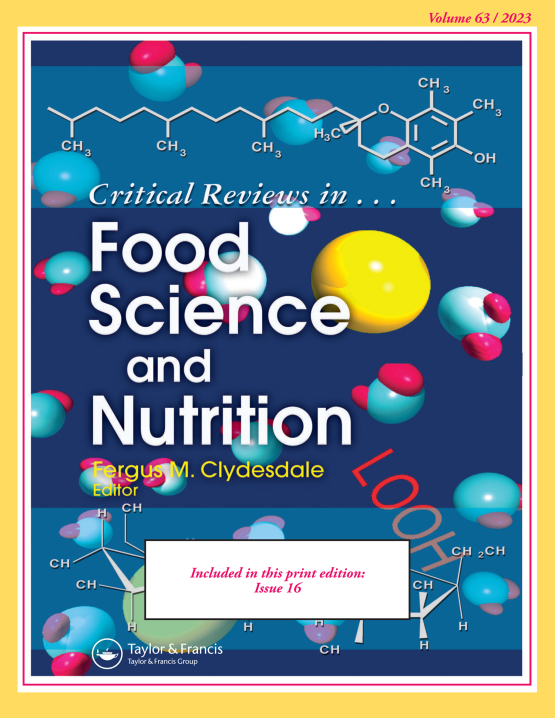Submit a Manuscript to the Journal
Critical Reviews in Food Science and Nutrition
For an Article Collection on
Nutrition and Health Benefits of Polyphenol-Rich Foods
Manuscript deadline

Article collection guest advisor(s)
Franck Carbonero,
Washington State University
Franck.carbonero@wsu.edu
Nutrition and Health Benefits of Polyphenol-Rich Foods
The superfood moniker for polyphenol-rich foods is both overly simplistic and misleading, especially when it solely derives from antioxidant claims. Scientific techniques to determine antioxidant status are continuously refined, and with that came more nuanced results. In addition, it is difficult to demonstrate that antioxidant properties of dietary elements have true physiological meaning in the context of the human body. Polyphenols bioavailability is a complex puzzle to piece together, though it may not need to be resolved to obtain relevant results. The important implication is that studies need to be designed carefully to account as best as possible for these variations. Modern “-omics” technologies have allowed scientists to start laying out the rules of polyphenols bioavailability through accounting for the modulating roles of digestive and cellular processes and more recently the microbiome. Critical reviews of both older and more recent investigations can now inform us of the true health benefits of polyphenol-rich foods and go way beyond calling them antioxidants.
Polyphenols abundance has been the driving factor for the agri-food industry to anoint specific fruits and vegetables as “superfoods”, most commonly with claims related to antioxidant power. While this use of the made-up term “superfood” is likely not a bad thing from a public health perspective, it is evident that the purported health claims often lack substantiation. Most dietary polyphenols are not only safe to eat, but also likely provide health benefits. Indeed, there are countless scientific reports on a diversity of potential health benefits published every month. Those studies include a variety of approaches, including chemistry profiling, obtention of phenolic extracts, in vitro, animal and human intervention as well as epidemiological studies. Isolated or extracted polyphenolic mixtures are often used for scientific enquiries (and even commercial dietary supplements), but it has increasingly been recommended to study the effect of whole foods for better translation to concrete applications.
Frank Carbonero, PhD is an Associate Professor in the Department of Nutrition and Exercise Physiology at Washington State University. His research program is focused on nutrition and its impact on the human and animal gut microbiome, with a focus on dietary polyphenols from berries, grains and other foods. His recent endeavors include the effect of cranberries on gut and vaginal microbiota; and elderberries and quinoa on cardiometabolic health and gut microbiota. He currently serves as an Associate Editor for Critical Reviews in Food Science and Nutrition.
Disclosure Statement: Franck Carbonero declares no conflict of interest regarding this work.
Benefits of publishing open access within Taylor & Francis
Global marketing and publicity, ensuring your research reaches the people you want it to.
Article Collections bring together the latest research on hot topics from influential researchers across the globe.
Rigorous peer review for every open access article.
Rapid online publication allowing you to share your work quickly.
Submission Instructions
This Article Collection invites both reviews and original research articles. All submissions will be expected to be focused around one or several polyphenol-rich food (PRF, whole foods or well-characterized phenolic extracts) combined with one or more of these subtopics:
- PRF and cardiometabolic/cardiovascular health
- PRF and brain health
- PRF and the gut microbiome and/or metabolome
- PRF and inflammation and/or the immune system
- PRF and the metabolic syndrome (obesity, diabetes…)
- Nutritional epidemiology aspects of PRF consumption and human health
- Food chemistry and impact of PRF preparation on health outcomes
- Food innovations designed to maximize health outcomes
- Mechanistic insights of molecular pathways involved in PRF’s health outcomes
All manuscripts submitted to this Article Collection will undergo desk assessment and peer-review as part of our standard editorial process.
Please review the journal scope and author submission instructions prior to submitting a manuscript.
The deadline for submitting manuscripts is April 1st, 2026.
To submit your papers to this Article Collection, please:
- Check "yes" for the question, "Are you submitting your paper for a specific special issue or article collection?"
- Select the relevant Article Collection from the drop-down menu under the question, "Special Issue or Article Collection Name."
All manuscripts submitted to this Article Collection will undergo desk assessment and peer-review as part of our standard editorial process. Guest Advisors for this collection will not be involved in peer-reviewing manuscripts unless they are an existing member of the Editorial Board. Please review the journal Aims and Scope and author submission instructions prior to submitting a manuscript.
